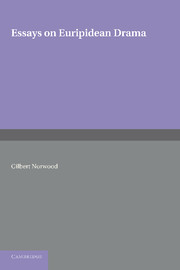II - THE BACCHAE AND ITS RIDDLE
Published online by Cambridge University Press: 05 June 2016
Summary
SINCE the year 1908 students of this play have been perturbed, more or less deeply according to their own temperaments and those of the commentators whom they have read, by a discussion published that year in The Riddle of the Bacchae. Whether it is true or not that this book's contentions “lie outside the main current of thought about the play”, it has occasioned a good deal of talk and writing; therefore its author, having conceived new ideas on certain features of the Bacchae, cannot but think a restatement desirable, with whatever apologies for egotism may seem needed.
The whole book arose from one fact, and one only. That fact remains unshaken.
When, after a scene of excitement, fear, and hubbub, Dionysus emerges from the palace to reassure his followers the Asiatic bacchants who form the Chorus, his description of what has occurred includes this (632-4):
“And in addition Bacchus works these further outrages upon him [King Pentheus] : he broke the house to the ground, and all is utter ruin…”
Language could not be plainer: the overthrow of Pentheus' palace, to the beginning of which the Chorus have borne frenzied witness, was in fact accomplished. That is the sole meaning the words can bear, the sole meaning that anyone (so far as appears) attached to them before the Riddle was published. Only then did scholars, shocked by the conclusions there drawn from this passage, seek to explain it otherwise; only then were heard those suggestions that “complete ruin” means “noises off” or a collapse merely of the stables. The apocalypse of an offended and triumphant god may be terrible, even fiendish: but at all costs it must not be shabby. The best defence of that desperate position has been made by Professor Grube:
First they [the Chorus] call upon the god to appear; then there is some reference to an earthquake…, and we must evidently suppose this to be shown…, perhaps by a sudden lurching movement of the chorus, accompanied by a shaking of the palace walls.
- Type
- Chapter
- Information
- Essays on Euripidean Drama , pp. 52 - 73Publisher: Cambridge University PressPrint publication year: 2013

